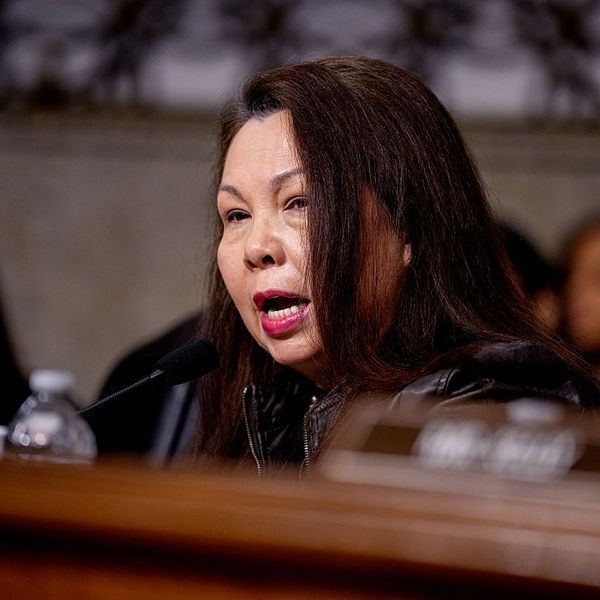The Trump Administration's decision to pull the United States out of the 2015 Joint Comprehensive Plan of Action--the landmark nuclear agreement between Iran and the United Kingdom, France, Germany, Russia, China, and the United States--strikes a dangerous blow against arms control and international security and even more firmly establishes the United States as a rogue nation.
This is a victory for Iranian hardliners, who opposed the treaty. They argued against destroying billions of dollars' worth of nuclear facilities and material in return for the lifting of debilitating sanctions, because the United States could not be trusted to lift the sanctions as promised. That, in the end, is exactly what happened.
Now Trump's decision will make it virtually impossible for North Korea or any other country to trust the United States to keep its treaty commitments and thereby sabotage future arms control negotiations.
The Iran pact is supported by virtually every country in the world. The vast majority of those in the U.S. national security establishment, current and retired, have supported it, as have the vast majority of nuclear scientists and policy experts. Even within Israel, there is strong support among intelligence and defense officials.
Trump argued that the treaty did nothing to curb Iran's intervention in Syria, Yemen, and elsewhere. But that was never its intention. Other such agreements seek to limit countries' nuclear ambitions, not their broader geopolitical ambitions.
And Trump's accusations of Iranian cheating are groundless. Indeed, his own CIA director and Director of National Intelligence have both acknowledged in recent weeks that Iran is in full compliance with the agreement, as has the head of the International Atomic Energy Agency. Accusations of Iranian cheating by the rightwing Israeli prime minister Benjamin Netanyahu last week referred back to Iran's long-acknowledged cover-up of a nascent weapons program more than fifteen years ago. This is in no way a new revelation, or relevant to the current agreement.
In short, the pact makes it physically impossible for Iran to build a single atomic bomb.
Similarly, Trump's insistence that that the agreement is somehow advantageous to Iran and would allow it to develop nuclear weapons is completely ludicrous.
The agreement reduced Iran's enriched uranium stockpile by 98 percent and restricts the level of enrichment to 3.67 percent. Given that an enrichment level of 90 percent is needed to build a nuclear bomb, this makes it impossible for Iran's uranium to be weaponized.
Under the deal, Iran also reduced its number of centrifuges to a little over 5,000, far below the number that would be needed to enrich uranium to anything close to that level. It prevented the commissioning of the Arak reactor, capable of producing plutonium, and restricts research and development activities in other facilities. And it cut off all of Iran's other potential pathways to obtaining a nuclear weapon.
In short, the pact makes it physically impossible for Iran to build a single atomic bomb.
In addition, the agreement imposes the one of the most rigorous inspection regimes in history. International inspectors monitor Iran's nuclear program at every stage: uranium mining and milling, conversion, enrichment, fuel manufacturing, nuclear reactors, and spent fuel, as well as any site--military or civilian--they consider suspicious.
And if Iran were to violate any aspect of this agreement, sanctions would automatically snap back into place.
Historically, most agreements on nuclear weapons have required some sort of reciprocity. But none of Iran's nuclear-armed neighbors--Israel, Pakistan or India--are required to eliminate or reduce their weapons or open their nuclear facilities to inspections, even though all three are currently violating U.N. Security Council resolutions regarding their nuclear programs. And none of the other nuclear powers, including the United States, are required to reduce their arsenals, either.
So, it is indeed, as Trump said, a "one-sided deal"--against Iran.
Trump and his Republican backers have long opposed efforts to ease tensions between the United States and Iran--especially any effort that might undermine excuses for going to war against that oil-rich nation. Iran, shackled by the 2015 agreement, is no threat to the United States. Iran's support for extremist groups, its human rights violations, its backing of repressive allies, and its other violations of international norms--while certainly wrong--are no worse than those committed by key U.S. regional allies.
The "threat" from Iran is that it is a regional power that has dared to challenge the United States' hegemonic ambitions in the greater Middle East. For advocates of "full spectrum dominance," as first articulated by the administration of George W. Bush in 2002, any such efforts to undermine U.S. hegemony are simply unacceptable.
Now Trump is free to undercut the Iranian economy by resuming comprehensive U.S. sanctions and forcing companies in other countries to avoid doing business with Iran by threatening to deny them trade and investment opportunities with the United States.
Trump's strategy appears to encourage the Iranians to resume their nuclear program in order to provoke a crisis that would give the United States an excuse to go to war.



